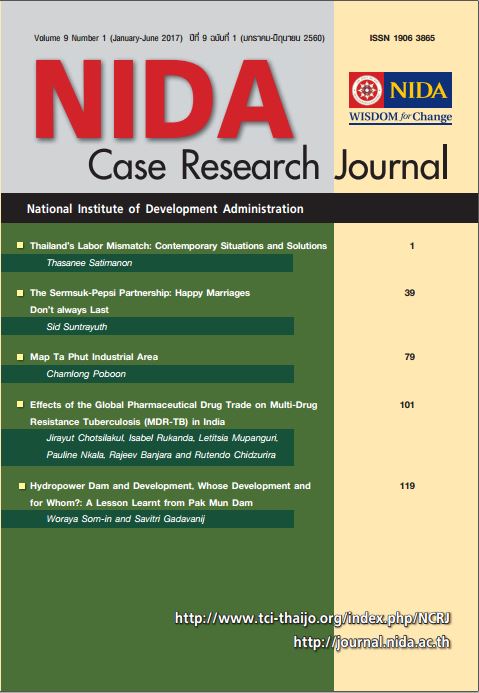Effects of the Global Pharmaceutical Drug Trade on Multi-drug Resistance Tuberculosis (MDR-TB) in India
Keywords:
Anti-microbial Resistance, Global Pharmaceutical Trade, Trade Agreement, Multi-drug Resistant Tuberculosis, ภาวะการดื้อยาปฏิชีวนะ, การค้ายาระหว่างประเทศ, ข้อตกลงระหว่างประเทศ, ภาวะเชื้อวัณโรคดื้อยาหลายขนานAbstract
Antimicrobial resistance (AMR) occurs when infectious agents—such as bacteria, viruses, fungi, and parasites—change in ways that make curative medicines and treatments ineffective. AMR threatens the effective prevention and treatment of an increasing range of infections—especially, HIV, malaria, and tuberculosis, leading to prolonged illness, deaths, and disabilities with important economic consequences to low- and middle-income countries. In recent years, counterfeit drugs, particularly in South Asia, hinder progress in dealing with AMR. This case study offers a description of the Multi-Drug Resistant Tuberculosis (MDR-TB), which is a type of microbial infection that did not respond to isoniazid and rifampicin—two most powerful anti-TB drugs. In mitigating this health-threatening issue, numerous countries and international agencies—such as World Trade Organization (WTO) and World Health Organization (WHO)—join their efforts in regulating the global pharmaceutical trade. The WTO in particular adopted the Trade-Related Aspects of Intellectual Property Rights (TRIPS), which established the ground rules for patent protection on pharmaceutical drugs.
The purpose of this case study is to enhance an understanding of how India deals with the AMR situation within the international regulatory framework governing the global pharmaceutical trade. India is one of the countries in which MDR-TB has frequently been encountered in recent years. In 2013, one quarter of all TB patients in the world (2.2 million people) were reported in India. The WHO estimates that about one million TB patients in India are not aware of their status. And, despite a high treatment success rate of 88%, the current number of patients with MDR-TB in India was 63,000 in 2013. Importantly, the majority of MDR-TB patients in India are socio-economically disadvantaged populations. As such, the MDR-TB situation in India does not only involve the biomedical issues, but also the social, economic, and political issues for the Indian government.
บทคัดย่อ
ภาวะการดื้อยาปฏิชีวนะ (Antimicrobial resistance: AMR) เกิดขึ้นเมื่อสิ่งที่ทำให้เกิด โรคติดต่อ ได้แก่ แบคทีเรีย ไวรัส เชื้อรา และเชื้อปรสิต เกิดการเปลี่ยนแปลงที่ลดประสิทธิภาพของ ยาและวิธีการรักษาโรค AMR ถือเป็นอุปสรรคสำคัญในการแก้ไขปัญหาโรคติดต่อร้ายแรง เช่น โรคเอดส์ โรคมาลาเรีย และวัณโรค ซึ่งก่อให้เกิดการเจ็บป่วยระยะยาว การเสียชีวิต และทุพพลภาพ ตลอดจนผลกระทบเชิงเศรษฐกิจที่เป็นลบต่อประเทศกำลังพัฒนา ทั้งนี้ ในหลายปีที่ผ่านมา ปัญหา ยาปลอมในแถบเอเชียใต้ทำให้ปัญหา AMR ทวีความรุนแรงมากขึ้น
กรณีศึกษานี้เกี่ยวกับสถานการณ์เชื้อวัณโรคที่ดื้อยาหลายขนาน (Multi-Drug Resistant Tuberculosis: MDR-TB) ซึ่งเป็นอาการติดเชื้อที่ไม่ตอบสนองต่อยา Isoniazid และ Rifampicin ซึ่ง เป็นยาต้านเชื้อ TB ที่มีประสิทธิภาพมากที่สุดในปัจจุบัน ทั้งนี้ เพื่อเป็นการแก้ไขปัญหา MDR-TB องค์กรระหว่างประเทศหลายองค์กร อาทิเช่น องค์การการค้าระหว่างประเทศ (WTO) และองค์การ
อนามัยโลก (WHO) เป็นต้น ได้ร่วมกันกำหนดมาตรการเพื่อควบคุมการค้ายาระหว่างประเทศ โดยเฉพาะข้อตกลง TRIPS เพื่อคุ้มครองทรัพย์สินทางปัญญาของสินค้าและการออกแบบทางอุตสาหกรรม รวมทั้งยาและเวชภัณฑ์ด้วย
วัตถุประสงค์ของกรณีศึกษานี้จึงเป็นการเพิ่มพูนความรู้ความเข้าใจในความสลับซับซ้อนของสถานการณ์ AMR ในประเทศอินเดีย และกระบวนการทางด้านกฎหมายระหว่างประเทศที่เกี่ยวข้องกับการค้าขายยาระหว่างประเทศ ทั้งนี้ ประเทศอินเดียเป็นหนึ่งในประเทศที่ประชาชนประสบวิกฤติ การเจ็บป่วยจากเชื้อวัณโรค โดยในปี พ.ศ. 2556 ผู้ป่วยวัณโรคจำนวน 1 ใน 4 คนทั่วโลก หรือ 2.2 ล้านคนเป็นผู้ป่วยชาวอินเดีย นอกจากนี้ องค์การอนามัยโลกยังได้ประมาณการไว้ว่า ผู้ป่วยวัณโรค จำนวน 1 ล้านคนในประเทศอินเดียไม่ทราบสถานะการติดเชื้อของตนเอง และแม้ว่าการรักษาอาการ ติดเชื้อวัณโรคในประเทศอินเดียจะประสบความสำเร็จถึงร้อยละ 88 กลับพบว่าประเทศอินเดียมี จำนวนผู้ป่วยโรค MDR-TB 63,000 คนในปี พ.ศ. 2556 ประการสำคัญคือ ผู้ป่วยโรค MDR-TB ในประเทศอินเดียโดยส่วนใหญ่เป็นประชากรกลุ่มด้อยโอกาสทางเศรษฐกิจและสังคม ทำให้ปัญหา MDR-TB เป็นทั้งปัญหาในเชิงวิทยาศาสตร์การแพทย์แลละปัญหาทางด้านเศรษฐกิจ สังคม และการเมืองที่ ท้าทายรัฐบาลของประเทศอินเดีย





